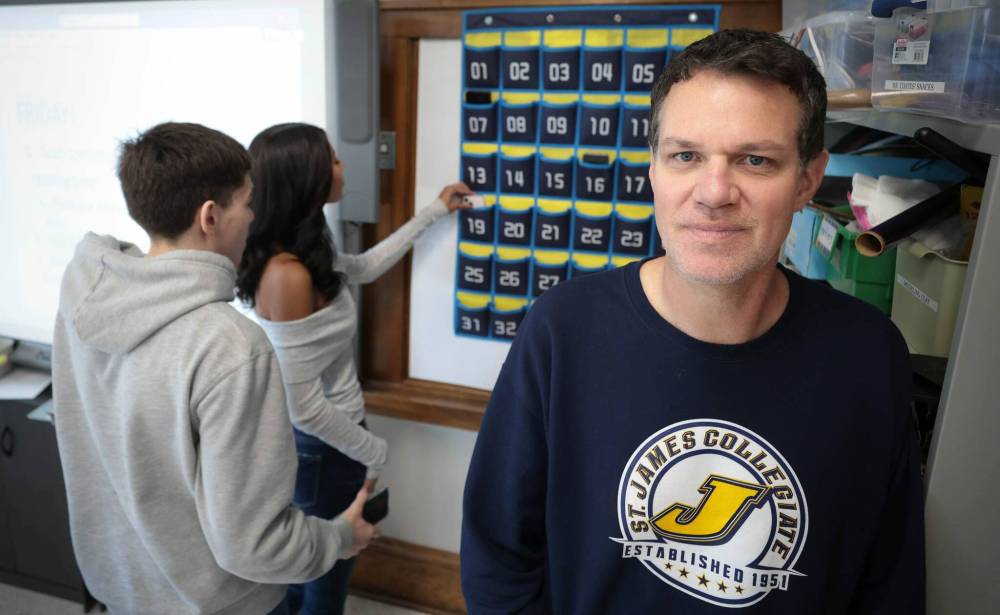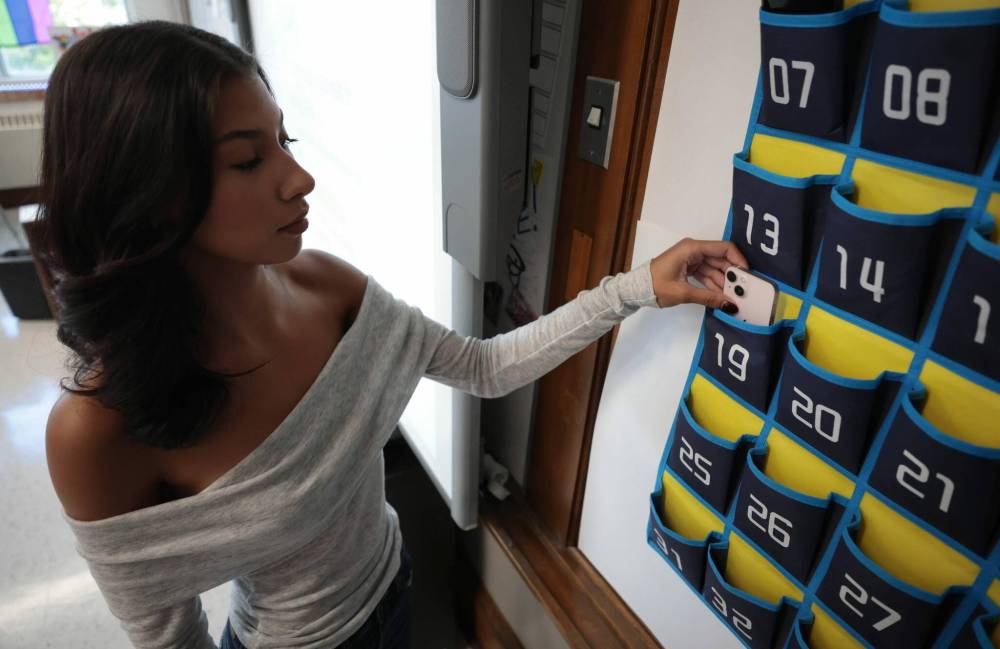The latest trend in Manitoba classroom decor is to hang charts with smartphone-sized slots — dubbed “phone hotels” by some — and it’s local teachers’ solution to enforce new rules on device use.
Principal Kyle Lizotte ordered 30 pocket charts to outfit St. James Collegiate, including the front office, with storage specifically for mobile devices ahead of students’ return this week.
“When things are predictable, that reduces the stress and increases the confidence (of everyone involved),” Lizotte said, noting the equipment cost about $30 apiece.

Ruth Bonneville / Free Press
Pocket sleeves and phone lockers are now common classroom items as schools enforce the province’s new phone ban.
Prior to the 2024-25 school year, Manitoba issued a ban on cellphones in elementary schools and new restrictions so Grade 9-12 students’ devices are silenced and out of sight when classes are in session.
Kindergarten-to-Grade 8 students are barred from using devices. High-schoolers can turn them on during breaks and when a teacher approves access for educational purposes.
School boards have until Nov. 1 to finalize policies, but leaders have alerted parents that devices — including smartwatches and music players — are off-limits and schools will not assume responsibility for the loss or damage to personal technology taken to school.
Exemptions are being made for medical and inclusion-related reasons.
Grade 10 students Felicity Tapawan and Naomi Apiado said they’ve both been surprised by the high compliance at Maples Collegiate, where teachers are using a combination of hanging storage units and boxes.
The 15 year olds said not having phones on hand all day is forcing students to interact with each other offline more than they have in the past.
“I’ve actually made new friends because of it,” Tapawan said Friday.
Apiado echoed those comments, adding that the new policy has already reduced her screen time.
The teenager, whose most commonly used app is TikTok, said she spent upwards of 10 hours on her iPhone on an average weekday last year. That figure dropped below seven this week.
What the province is billing as a phone ban is really “a digital wellness initiative,” said Troy Sigvaldason, president of the Manitoba Association of Educational Technology Leaders.
It was becoming increasingly clear that teachers needed support to navigate the growing distraction of phones, which both students and staff were especially reliant on during the COVID-19 pandemic, said Sigvaldason, an information technology director at a rural school division.
Students and teachers have told the Free Press that a previous patchwork of policies was resulting in students scrolling social media, making phone calls, and ordering takeout on meal delivery apps during lessons.
Combined with anecdotal concerns, the release of The Anxious Generation — a 2024 bestseller in which American social psychologist Jonathan Haidt makes the case that “the great rewiring of childhood” has led to an epidemic of mental illness — caught local school leaders’ attention this year.
The Winnipeg School Division, the largest of its kind, sent families a list of phone tips based on the non-fiction book last week.
Sigvaldason said there is no one-size-fits-all solution to resetting relationships with devices so an adjustment period is inevitable, and it will involve parents getting reacquainted with calling a school office to contact their children instead of the immediacy allowed via text in years past.

Ruth Bonneville / Free Press
St. James grade 12 high school students, Jamaica Tippmann places her phone in the cell phone pocket in Mr. Coates class.
His employer, the Prairie Spirit School Division is asking visitors to be role models and silence their phones while on campus.
“Will a kid put a calculator into a cellphone hotel and pocket their phone? Probably… We’re going to learn and roll with it as the school year kicks off,” he said, adding the goal is to figure out meaningful, educational ways to reintroduce technology in classrooms.
West Kildonan Collegiate administration was ahead of the curve in announcing strict phone rules in the winter and ordering more than 40 phone hotels in bulk to cover every classroom.
Principal Adam Hildebrandt said it took about a week for students to settle into the new routine and the results at the end of the term were rewarding for everyone.
Teachers were able to cover more course content than usual and students were more engaged, in part because they stopped requesting as many washroom breaks to check their phones, Hildebrandt said.
His advice to colleagues is to prioritize consistent protocols across a school and clear communication so students understand changes were made because the adults around them care about their well-being.
St. James Collegiate staff are being intentional about the language they use around updated protocols — rather than “phone ban,” the principal calls it a “phone-free policy” — to encourage understanding and buy-in, Lizotte said.
The high school principal said his staff came to a consensus that hanging storage was necessary in every learning space to provide employees and students with a “positive option” to limit distractions.
Students are being asked to store their phone in a locker before heading to class or put it in a designated pocket upon arrival.
The plan is to meet initial breaches with a reminder and subsequent placement in a pocket. If a phone proves to be a continuous distraction, administrators will babysit it at the office until the end of the day and, if necessary, raise issues with a family.
“We don’t expect perfection. We expect a great learning environment and part of that is having a good relationship with your teachers and to have devices away as expected by the province,” Lizotte said.
maggie.macintosh@freepress.mb.ca

Maggie Macintosh
Education reporter
Maggie Macintosh reports on education for the Free Press. Originally from Hamilton, Ont., Maggie was an intern at the Free Press twice while earning her degree at Ryerson’s School of Journalism (now Toronto Metropolitan University) before joining the newsroom as a reporter in 2019. Read more about Maggie.
Funding for the Free Press education reporter comes from the Government of Canada through the Local Journalism Initiative.
Every piece of reporting Maggie produces is reviewed by an editing team before it is posted online or published in print — part of the Free Press‘s tradition, since 1872, of producing reliable independent journalism. Read more about Free Press’s history and mandate, and learn how our newsroom operates.
Our newsroom depends on a growing audience of readers to power our journalism. If you are not a paid reader, please consider becoming a subscriber.
Our newsroom depends on its audience of readers to power our journalism. Thank you for your support.